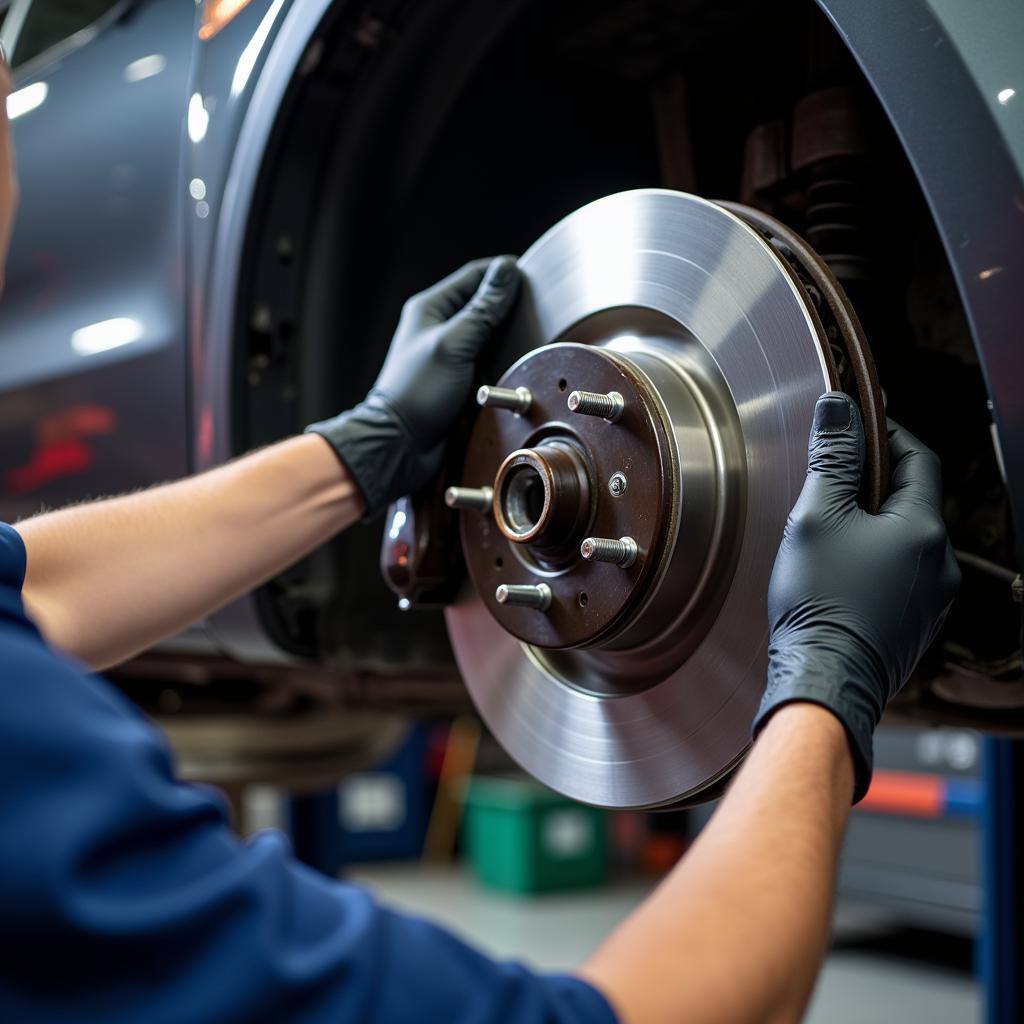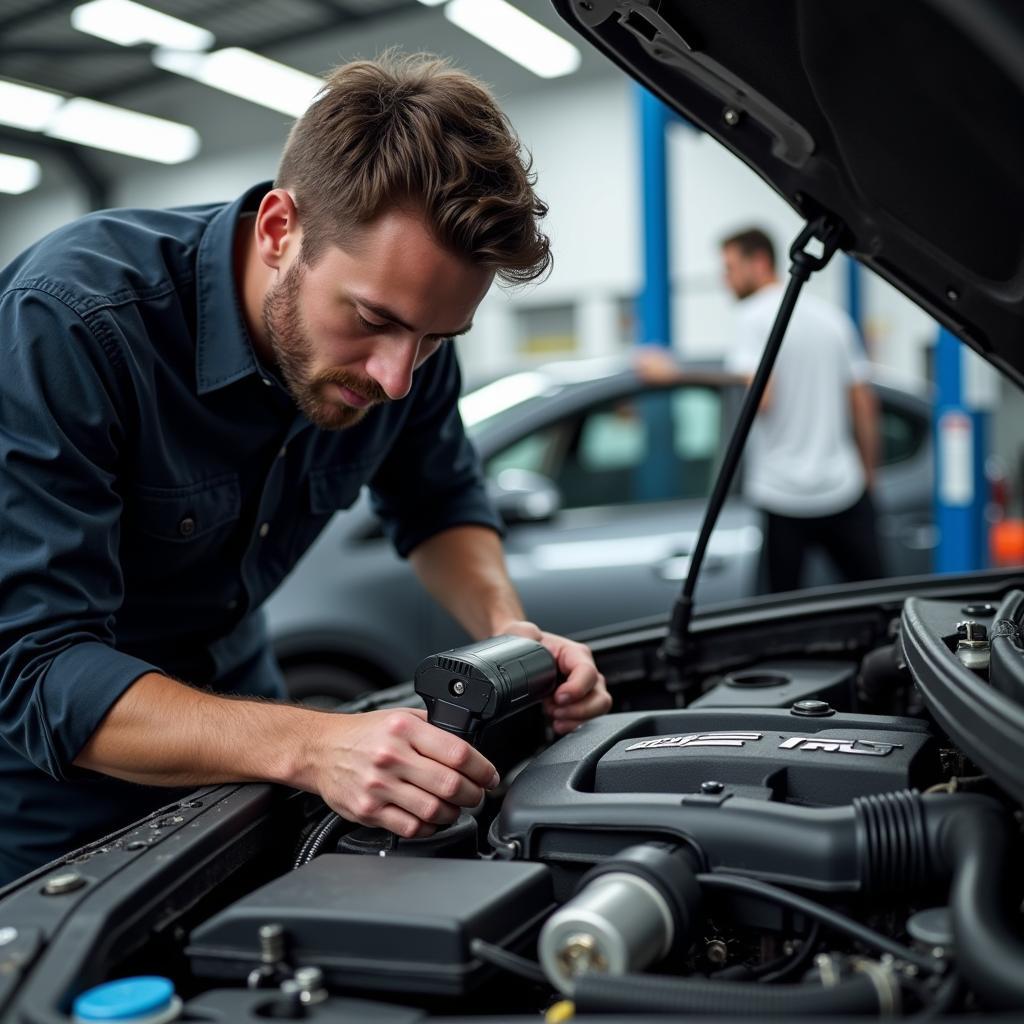What is Done in a Full Car Service?
A full car service, also known as a major service, is a comprehensive inspection and maintenance procedure for your vehicle. It goes beyond the basic checks of an interim service and addresses key areas to ensure your car runs smoothly and safely. If you’re wondering, “What Is Done In A Full Car Service?”, read on to find out what this essential service entails and why it’s crucial for your car’s health.
Unveiling the Full Car Service Checklist: A Deep Dive
A full car service is an extensive procedure designed to cover all crucial areas of your vehicle. It typically includes everything from a basic service, plus additional checks and replacements. Here’s a breakdown of the key components:
Engine and Components:
- Oil and Filter Change: This is standard procedure to ensure your engine is properly lubricated.
- Air Filter Inspection/Replacement: A clean air filter allows for optimal airflow to the engine, enhancing performance.
- Spark Plug Examination/Replacement: Spark plugs ignite the air-fuel mixture in the cylinders, and worn-out plugs can lead to misfires and reduced fuel efficiency.
- Fuel System Check: This involves inspecting the fuel lines, pump, and filter for leaks or blockages to ensure optimal fuel delivery.
- Cooling System Inspection: The coolant level is checked, and the radiator and hoses are examined for leaks to prevent engine overheating.
Transmission and Drivetrain:
- Transmission Fluid Check: The fluid level and condition are inspected, and a change might be recommended based on mileage and manufacturer guidelines.
- Clutch Inspection (Manual Cars): The clutch operation, fluid level, and wear are checked for smooth gear changes.
- Driveshaft and Axle Examination: These components are inspected for wear and tear, ensuring proper power transmission to the wheels.
Braking System:
- Brake Pads and Discs Inspection: The thickness and condition of the brake pads and discs are checked, and replacements are recommended if needed.
- Brake Fluid Check: The fluid level and condition are examined, as brake fluid is hygroscopic and absorbs moisture over time, affecting braking performance.
- Handbrake Adjustment: The handbrake is tested and adjusted for optimal parking brake function.
 Car Brake System Check
Car Brake System Check
Steering and Suspension:
- Power Steering Fluid Check: The fluid level is topped up as necessary to ensure smooth steering operation.
- Steering Linkage Inspection: The various components of the steering system are checked for wear and tear, ensuring responsive and accurate steering.
- Suspension Check: Shocks, struts, and other suspension components are inspected for proper function and to maintain a comfortable ride.
Electrical System:
- Battery Test: The battery’s voltage and charging capacity are tested to ensure it’s in good working order.
- Alternator Check: The alternator, responsible for charging the battery, is inspected for proper function.
- Lights Inspection: All exterior and interior lights are checked for proper operation and replaced if needed.
Tires and Wheels:
- Tire Pressure Check and Adjustment: Tires are inflated to the recommended pressure for optimal performance and fuel efficiency.
- Tire Tread Depth Inspection: The tread depth is measured to ensure it meets legal requirements and provides adequate grip.
- Wheel Alignment Check: Wheel alignment is checked to prevent uneven tire wear and ensure the car drives straight.
Other Checks:
- Fluid Top-offs: Other fluids, such as windshield washer fluid, are topped up as needed.
- Visual Inspection: A thorough visual inspection of the entire vehicle is conducted to identify any potential issues or damage.
- Road Test: A test drive is often performed to assess the car’s overall performance and identify any issues that may not be apparent during a static inspection.
Is a Full Car Service Worth It?
You might be wondering, “Is a full car service worth it?” The answer is a resounding yes. While it might seem like an expense, a full car service can save you money in the long run. Regular maintenance can prevent costly repairs down the line by catching small issues before they escalate.
“Think of a full service as an investment in your car’s health and longevity,” says John Smith, a seasoned automotive engineer with over 20 years of experience. “Just like regular check-ups with your doctor can prevent major health concerns, a full car service ensures your vehicle is in top condition and can potentially extend its lifespan.”
How Much is a Full Service on My Car?
The cost of a full car service can vary depending on factors like your car’s make and model, the service center you choose, and your location. To get an accurate estimate, it’s best to contact your local car service center. If you’re curious about the potential costs, you can find more information on “how much is a full service on my car” on our website.
Why Choose CarServiceOnline for Your Car Service Needs?
At CarServiceOnline, we understand the importance of finding a trusted and reliable service center for your vehicle. That’s why we’ve created a platform that connects you with top-rated service centers in your area. Our website provides comprehensive information about various car services, including “how to service the car” yourself if you’re mechanically inclined. We aim to empower car owners with the knowledge and resources they need to make informed decisions about their vehicle’s maintenance.
Frequently Asked Questions About Full Car Service
-
How often should I get a full car service? – As a general rule, a full car service is recommended every 2 years or 24,000 miles, whichever comes first. However, it’s best to refer to your owner’s manual for your car’s specific service intervals.
-
What’s the difference between a full service and an interim service? – An interim service covers the basics, like an oil change and some visual inspections. A full service is much more comprehensive, including more in-depth checks, fluid changes, and potential part replacements.
-
Can I do a full car service myself? – If you have advanced mechanical skills and the proper tools, you can perform some tasks yourself. However, certain aspects require specialized equipment and expertise, so it’s generally recommended to have a qualified mechanic perform a full car service.
-
What happens if I delay a full car service? – Delaying service can lead to a decline in your car’s performance, fuel efficiency, and safety. It also increases the risk of more severe and expensive problems arising in the future.
-
Why should I choose a reputable service center for a full car service? – Choosing a reputable service center ensures that qualified technicians using quality parts are working on your car.
Need More Information?
For more details on car servicing costs, you can check out our article on “how much cost for car service“. Alternatively, if you are wondering if “should i wash the car before service”, we have a dedicated article addressing that too.
Get in Touch
Got more questions about full car services or need help finding a reliable service center? Our team at CarServiceOnline is here to assist you. Reach out to us via WhatsApp: +1(641)206-8880, Email: [email protected]. Our dedicated customer support team is available 24/7 to answer your queries and guide you in the right direction.

